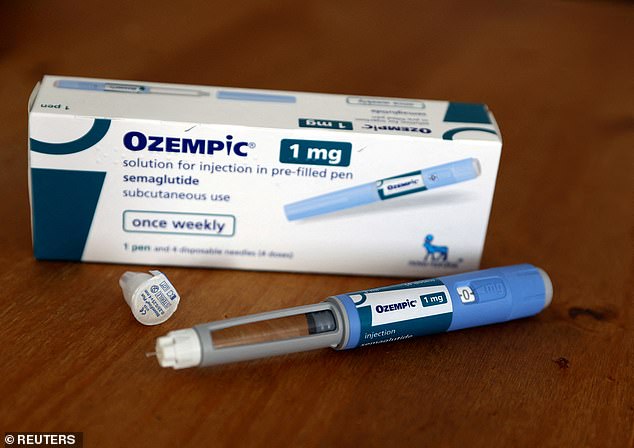Pharmaceutical bigwigs are already enjoying the blockbuster profits from weight-loss drugs such as Ozempic, with drug companies having raised a considerable £20bn from them this year.
But really fat cats – and portly puppies – could be a new group of “patients” who would benefit from slimming injections, according to experts.
British pets, like their owners, are becoming chubbier, for many of the same reasons: they eat too much and don’t get enough exercise.
It therefore seems inevitable that as more and more people turn to weight loss injections such as Wegovy and Ozempic, as well as its rival Mounjaro, there will be growing interest in using them on our four-legged friends.
Surveys suggest that the pet obesity crisis, like the human battle against obesity, is getting worse.
The portly pups could one day be given a drug like Ozempic to help them slim down like their owners, as some companies invest millions in trials.

Obese felines are also in the crosshairs of pharmaceutical giants: A clinical trial found that a drug similar to Ozempic caused cats to lose 5 percent of their weight.
An estimated 50 per cent of dogs and 43 per cent of cats are overweight or obese according to almost 150 vets surveyed by UK Pet Food.
And of the veterinarians surveyed, 77 percent said they believed the prevalence of obesity among pets had increased.
Professor Alex German, a small animal medicine expert at the University of Liverpool who runs a specialist obesity clinic for dogs and cats, believes we may one day see our pets given drugs such as Ozempic.
He believes that semaglutide, the active ingredient in Ozempic and Wegovy, could, similarly to how it does in humans, restrict pets’ appetite and therefore be an effective treatment for obesity in some cases.
However, he added that this will depend on it being shown to be safe and effective in animal trials.
Professor German added that while dietary medications for pets, an oral drug called Slentrol, had been launched in the past and were unsuccessful, he believed owners and vets were more likely to accept them in the Ozempic era.
“The idea that obesity in pets is the fault and responsibility of the owner is wrong, as it can be genetic and is more complex than one owner having problems. We should support owners as best we can,” she said. The Telegraph.
Veterinarian Alicia Fox-Pitt agreed, saying she could imagine its use in situations where an owner can no longer exercise their pet or control their diet.
“If a family member has dementia, they will often forget that they have fed the dog,” she said.
Unsurprisingly, pharmaceutical companies are already exploring the potentially lucrative market for Ozempic for pets.

Wegovy works by causing the body to produce a hormone called glucagon-like peptide 1 that is released naturally from the intestines after meals.
In February, Better Choice, a pet pharmaceutical company, announced it was doing just that.
‘The goal of the research and development work is to reflect the weight loss benefits of leading pet and human brands, including Slentrol, Wegovy, Ozempic and Mounjaro, with added proteins and nutrients from the Company’s Halo products for promote lean muscle mass and overall health in pets,’ according to a company statement.
Better Choice is putting its words into practice, planning to spend $1.5m (£1.185m) on trials for a GLP-1 agonist for pets, the class of drugs to which Ozempic, Wegovy and Mounjaro belong.
Some companies are already trying them out. In May this year, biotech firm Okava Pharmaceuticals announced the results of a small trial in which they implanted cats with a GLP-1 agonist delivery system and then measured their weight for 112 days.
At the end of the study, published in the journal BMC Veterinary Research and in which five cats participated, four of them lost 5 percent of their body weight.
However, Professor German said he would probably recommend pet owners embark on a weight-reduction diet to help overweight animals lose weight.
The method used for dogs involves special foods, exercise programs depending on the breed and size of the pet, and methods to prolong feeding, such as puzzle feeders in which the animal has to manually extract the food from a special container.
He argued that this can cause overweight pets to lose between 20 and 25 percent of their body weight, allowing them to have greater mobility and quality of life.
“A therapeutic diet is safe and effective. Since we already have an option that can work as well as drug therapy, why rush to use it?” he said.
The Royal Society for the Prevention of Cruelty to Animals recommends that dogs get at least 30 minutes of exercise every day.
The advice for cats is a little more extensive, but the charity says our feline friends should still have plenty of opportunities for exercise, such as climbing and playing, every day.
GLP-1 agonists work by mimicking a hormone that the body naturally releases to tell us that we are full.
Weekly injections such as Ozempic, Wegovy and Mounjaro have been shown to be very effective in helping obese people lose excess weight, with some people losing up to 22.5 percent of their weight while taking them.
However, as with any medication, side effects have been reported, including some Hollywood celebrities who have lost control of their bowel movements.
Officials also recommend that people who use them take them for life, otherwise users could simply put the pounds back on, a rule that can also apply to pets taking the medications.
Drugs like Ozempic were originally designed to help people with diabetes manage their condition, but the treatment was found to also lead to weight loss.
The enormous demand, even among those who take it for aesthetic reasons, has caused some diabetes patients to go without it.
While production is increasing, opening the market to pets could stretch supply even further.
The sky-high demand has also led pharmaceutical giant Novo Nordisk to enjoy a huge profit boom thanks to huge demand for the Ozempic and Wegovy vaccines.
Earlier this year, the Danish company revealed it was earning £32m a day, as countries struggling with the financial cost of sagging struggle to get the jabs.
Analysis suggests combined sales of the company’s Ozempic and Wegovy brands have generated £20.5bn this year.

Ozempic contains the active ingredient semaglutide and although it is classified as a diabetes medication, some people have used it to lose weight. Could we soon give it to pets?
British pets fare better than their owners when it comes to maintaining flab; Overall, two-thirds of all British adults are now too fat.
It is well proven that obesity increases the risk of serious health problems that can damage the heart, such as high blood pressure and cancer.
Being overweight is estimated to cause one in 20 cases of cancer in Britain, according to Cancer Research UK.
Britain’s obesity crisis is also estimated to cost the country nearly £100 billion a year.
This colossal figure includes health damage to the NHS, as well as secondary economic effects such as loss of income from people taking time off work due to illness and premature death.

